6 Benefits Of Bacon, Nutrition, & How To Add It To Your Diet
Yes, you read it right! Your yummy breakfast snack can do amazing things for your health.
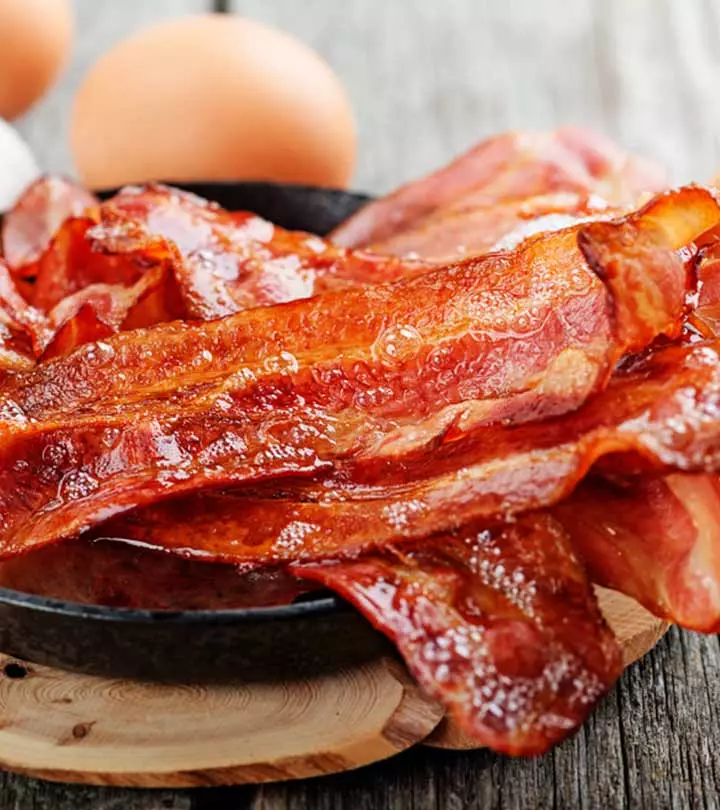
Image: Shutterstock
Bacon is a favorite for many for its unique taste. But its high cholesterol content can be a concern for many. However, the benefits of bacon are gaining attention due to its few beneficial nutrients. Based on the part of the pork being used and the processing methods, bacon is classified into different types – jowl bacon, collar bacon, and side bacon. There are many ways to include bacon in your diet. Learn more about them, the health benefits of bacon, and its side effects. Keep reading.
In This Article
Bacon Nutrition Facts
As with most meats, bacon is fairly nutritious and can easily supplement a healthy diet, when taken in moderation. As per FDA, a typical 100-gram portion of bacon contains (1):
- Protein – 33.33 g
- Carbohydrates- 0 g
- Fats – 46.67 g
- Sodium – 1.8 g
- Sugars- 0 g
- Cholesterol – 100 mg
- Calories – 600 kcal
As we can derive from the nutritional facts of bacon stated above, a typical portion of cooked bacon contains a good amount of fat, with about 50% of that consisting of monounsaturated fats and oleic acid (the healthy fat known to make olive oil good for the heart and health). This shows that not all fat content in bacon is of concern (2).
 Trivia
TriviaThat being said, a significant portion of fats in bacon is saturated fats which ring the alarm bell. Though it is known that a high intake of saturated fats may affect your heart and overall health, there have been no direct links found as such (3). Basically, if you regulate your portion size and eat bacon in balanced proportions, then there’s not much to worry about.
Even though it is high in sodium and fat content, it is not high in calories. With its high-fat, high-protein content and almost no carbohydrate, it makes for a good meal when it comes to low-carb protein-rich Keto diets (4).

Bacon can offer certain health benefits when eaten in moderation and incorporated into your meals in a balanced healthy way.
Key Takeaways
- Bacon is moderately nutritious and contains protein, fat, and sodium.
- It is low in calories, making it a perfect fit for a low-carb, protein-rich keto diet.
- Bacon contains essential nutrients, improves cardiac health, and enhances your mood, among other benefits.
- However, as it is processed meat, it could lead to lifestyle diseases, a high sodium content, and more.
Health Benefits Of Bacon
Typically, bacon goes through a manufacturing process called ‘curation’ wherein it is soaked in a solution of salt, nitrates, and sugar. Whether its health benefits outweigh its side-effects, mostly depends on how it is manufactured and the kind of additives added therein. Let’s have a look at its health benefits first.
- Provides Essential Nutrients
Bacon is a good source of high-quality animal protein, important B-vitamins, and minerals like phosphorus and selenium (5). While the protein provides the necessary amino acids to build muscle mass, the vitamin B complex plays a vital role in the body’s metabolic processes.
Niacin (vit B3), pyridoxine (vit B6), and biotin (vit B7), are important in breaking down the fats and carbohydrates to aid the digestion process. Other B vitamins such as Thiamin (vit B1) and Folate (vit B9), are crucial to complex cellular processes such as DNA replication and cell division (6). These also play an important role in the formation of neurotransmitters.
Selenium is another important mineral found in bacon that acts as an antioxidant, reducing the risk of certain cancers and heart diseases, while building immunity as well (7). As mentioned in the Scientific Consensus, it has also been found to reduce the use of corticosteroid medicines in people suffering from chronic asthma (8).
Apart from these, bacon is also a good source of omega-3 fatty acids that helps reduce cholesterol and improve overall heart health (9).
- Aids Brain Development
Bacon, like most meat, is a good source of choline. Choline is an essential nutrient that plays a vital role in the development of the brain. It is known to be crucial in fetal brain development and healing abnormalities in degenerative diseases like Alzheimer’s and dementia as well (10).
- Improves Cardiac Health
Bacon, though rich in fats, is surprisingly good for our heart. It contains a significant amount of omega-3 fatty acids that help in reducing cholesterol and improving cardiac health overall. Bacon also contains good amounts of saturated fats and oleic acids that aid in decreasing cholesterol levels (11).
- Natural Mood Booster
It might seem strange but eating bacon can actually uplift your mood. While eating any processed food might seem to have this blissful effect, there’s actually some science behind it Studies have shown that a deficiency of amino acids and certain neurotransmitters can aggravate common mental disorders such as bipolar disorder, schizophrenia, obsessive-compulsive disorder, and even clinical depression (12). Bacon is a natural mood enhancer that helps attain a positive state of mind, an overall feeling of satisfaction, and lower stress levels.
 Fun Fact
Fun Fact- Helps Satiate Food Cravings
Bacon, being rich in healthy fats and high in protein content, makes you feel full after a diet. It satiates your hunger pangs while maintaining your energy levels and metabolism efficiently.
- Helps Maintain The Electrolyte Balance
Athletes often tend to sweat out so much that it might cause an electrolyte imbalance for them. In such cases, they are recommended a high-sodium diet to help in managing symptoms of what is known as Postural Orthostatic Tachycardia Syndrome (POTS) (13 ). Bacon, being a high-sodium food, helps them maintain the salt balance. As per anecdotal evidence, a bacon diet might help relieve hangover headaches as well.
In good practice, it’s best to pair bacon with healthy vegetables and other nutritious food to get the most out of its health benefits and flavors. Going further we have a look at a few ways of including bacon in your diet in a healthy way.
How To Include Bacon In A Healthy Diet
You can enjoy having bacon in your diet if you know how to balance its nutrients and keep your portions in check.
- Instead of having bacon as the primary component of your meal, you can just sprinkle it over your favorite wholewheat pasta or any salad full of greens to add to its flavor.
- You can make a low-fat chicken wrap with grilled vegetables and a slice of bacon.
- Grilled bacon with eggs and toast also makes for another hearty meal.
- You can also make a breakfast bowl by mixing scrambled eggs, spinach, and chopped bacon, then adding avocado to get a boost of healthy fats.
Manuela, a food blogger passionate about sharing recipes, expresses her enthusiasm for bacon for breakfast, saying, “What’s not to love about this breakfast sandwich?!? It has it all. The crispy bacon, the drippy egg, the melty cheese, the healthy tomatoes and lettuce. All squooshed between two perfectly grilled, crispy-on-the-outside, soft on the inside bread slices. Even if you are not a cook, this sandwich is super easy to prepare (i).”
A survey conducted by YouGov in 2019 comprising 1,295 US adults revealed that 71% of respondents prefer their bacon to be somewhat (37%) or very (34%) crispy, while 20% of them lean towards a chewier texture.It shed light on breakfast preferences across the nation, emphasizing the significance of bacon in an ideal American breakfast platter.
The key to enjoying bacon as part of a healthy lifestyle is to eat it occasionally, not every day.
You can cook bacon on the stovetop, in the oven, or even in your air fryer. Scroll down to learn how.
How To Cook Bacon?
Here are some ways you can use to cook your bacon:
Stovetop Method
- Heat a skillet on the stovetop over medium heat and lay the bacon slices in a single layer.
- Cook them for about 4-6 minutes on each side, or until it reaches your desired level of crispiness.
Oven Method
- Preheat your oven to 400°F.
- Place a wire rack on top of a baking sheet and lay the bacon slices on the wire rack in a single layer.
- Bake for 15-20 minutes.
Air Fryer Method
- Preheat your air fryer to 350°F.
- Place the bacon slices in a single layer in the air fryer basket.
- Cook the bacon for 5-6 minutes.
- Flip the bacon and cook for another 5-6 minutes.
Remember to cook bacon slowly over low heat until crispy. High heat causes the fat to break down into unhealthy trans-fats. You can then use some paper towels to wipe off the excess fat. One should be careful not to overcook or burn the bacon as that triggers the carcinogenic ingredients.
Ensure you use high-quality pork fat. Opting for good-quality pork allows you to enjoy a rich flavor and numerous pork benefits, including essential nutrients, mainly protein and iron. Look for fatty cuts of meat that contain the highest amount of saturated fat. This includes the loin, belly, ham, and shoulder. These cuts of meat have a lot of flavors and are often cheaper than other leaner cuts.
In case you are not comfortable having bacon, you can still get the feel and flavor of it with certain bacon-like alternatives. Turkey bacon and vegan bacon are the two most popular bacon alternatives these days.
Bacon Alternatives
Turkey Bacon
While Turkey bacon has the same cons of being processed meat, it is still less in calories and fats when compared to regular bacon. It has a slightly different taste and texture but still adds the required flavor to your meals without much of a fat intake.
Vegan Bacon
In case you have decided to follow a plant-based diet but miss the flavor of bacon, you can then use the alternative of store-bought vegan bacon or make your own versions out of marinated tofu, tempeh, or seitan. While these are high in protein, they have almost no fat. Hence, it is best to pair these with vegan fat sources like avocado to get a balanced satiated meal.
Drawbacks Of Bacon
- High Sodium Content
The manufacturing process of bacon involves the curing of meat in salt or brine, which invariably adds to its high sodium content. A typical single serving contains one-fourth of the recommended dietary allowance for sodium. Hence it becomes crucial that you watch your portion size and complement it with other nutritious diets. This would help to reduce the harmful effects of excess salt intake like stomach cancer and high blood pressure (14), (15).
- Nitrates And Nitrites
During the curing process, bacon is processed with the addition of nitrates and nitrites, which when exposed to high heat tend to form nitrosamines, which are potential carcinogens (16). To mitigate this concern, many bacon producers have started using certain antioxidants in the curing process to lower the nitrate content in bacon thereby reducing the risks .
- Processed Meat And Lifestyle Diseases
Bacon is a processed meat product and regular intake of any processed meat is known to be associated with a higher likelihood of developing particular cancers and other diseases. It increases the risk of certain heart conditions and diabetes as well. (17),(18) Also, eating processed foods regularly, generally hints at unhealthy lifestyle habits. Usually, people with a sedentary and inactive lifestyle tend to have a high intake of processed food, smoke more often, and exercise less frequently. All these add up to the cumulative effect on our health and well-being.
Conclusion
Bacon is made from pork and is known for its unique taste. It is rich in cholesterol and nutrients that help treat many ailments. Bacon benefits your health in numerous ways. It plays a key role in the body’s metabolic processes, reduces the risk of cancer and heart disease, improves immune health, aids in brain development, and decreases cholesterol levels. You can easily include bacon in your diet. Combining bacon with nutrient-dense foods like vegetables and whole grains can boost its health advantages while reducing any potential risks. Also, excess intake may increase cancer risk due to the presence of nitrates and nitrites (potential carcinogens) and heart disease. Having bacon as an occasional treat rather than a regular part of your diet can support overall health. Hence, consume bacon in moderation to avoid its negative effects.
Frequently Asked Questions
Is bacon good for your skin?
No. The presence of nitrates in bacon may cause inflammation and wrinkles and harm your skin.
Is bacon good for weight loss?
Yes. Bacon may help with weight loss. However, choosing a leaner cut plays a key role in your weight loss regimen. In addition, consuming fewer carbs increases the number of calories you burn.
What’s a better way than to start your day with an energizing breakfast made with bacon? It fuels your body, providing essential nutrients to support your health. Check out the following video to learn more about its health benefits.
Personal Experience: Source
StyleCraze's articles are interwoven with authentic personal narratives that provide depth and resonance to our content. Below are the sources of the personal accounts referenced in this article.
(i) How to Make a Scrumptious Breakfast Sandwich for Father’s Dayhttps://www.cookingwithmanuela.com/2017/06/how-to-make-scrumptious-breakfast.html?m=1
References
Articles on StyleCraze are backed by verified information from peer-reviewed and academic research papers, reputed organizations, research institutions, and medical associations to ensure accuracy and relevance. Read our editorial policy to learn more.
- Bacon
https://fdc.nal.usda.gov/fdc-app.html#/food-details/400999/nutrients - An Overview Of The Modulatory Effects Of Oleic Acid In Health And Disease
https://pubmed.ncbi.nlm.nih.gov/23278117/ - Meta-analysis Of Prospective Cohort Studies Evaluating The Association Of Saturated Fat With Cardiovascular Disease
https://pubmed.ncbi.nlm.nih.gov/20071648/ - Ketogenic Diet
https://www.ncbi.nlm.nih.gov/books/NBK499830/ - Pork Bacon Rendered Fat Cooked
https://fdc.nal.usda.gov/fdc-app.html#/food-details/168324/nutrients - Vitamin B-12
https://www.ncbi.nlm.nih.gov/labs/pmc/articles/PMC3262614/#:~:text=Thus%2C%20vitamin%20B%2D12%20ispreventing%20homocysteine%20accumulation%20(1). - Selenium: Its Role As An Antioxidant In Human Health
https://www.ncbi.nlm.nih.gov/labs/pmc/articles/PMC2698273/ - Decreased Consumption Of Corticosteroids After Selenium Supplementation In Corticoid-dependent Asthmatics
https://pubmed.ncbi.nlm.nih.gov/12061082/ - Recent Clinical Trials Shed New Light On The Cardiovascular Benefits Of Omega-3 Fatty Acids
https://www.ncbi.nlm.nih.gov/labs/pmc/articles/PMC6822654/ - Associations Of Dietary Choline Intake With Risk Of Incident Dementia And With Cognitive Performance: The Kuopio Ischaemic Heart Disease Risk Factor Study
https://academic.oup.com/ajcn/article/110/6/1416/5540729?login=true - Does Dietary Cholesterol Matter?
https://pubmed.ncbi.nlm.nih.gov/27739004/ - Understanding Nutrition Depression And Mental Illnesses
https://www.ncbi.nlm.nih.gov/labs/pmc/articles/PMC2738337/ - Postural Tachycardia Syndrome (Pots)
https://www.ncbi.nlm.nih.gov/books/NBK541074/ - Dietary Salt Intake And Risk Of Gastric Cancer
https://pubmed.ncbi.nlm.nih.gov/24114476/ - Mechanisms Of Salt-Sensitive Hypertension
https://pubmed.ncbi.nlm.nih.gov/26028243/ - Dietary Nitrates Nitrites And Nitrosamines Intake And The Risk Of Gastric Cancer: A Meta-analysis
https://pubmed.ncbi.nlm.nih.gov/26633477/ - A Prospective Study Of Red And Processed Meat Intake In Relation To Cancer Risk
https://pubmed.ncbi.nlm.nih.gov/18076279/ - Red And Processed Meat Consumption And Risk Of Incident Coronary Heart Disease Stroke And Diabetes Mellitus: A Systematic Review And Meta-analysis
https://pubmed.ncbi.nlm.nih.gov/20479151/
Read full bio of Reda Elmardi
Read full bio of Varsha Patnaik
Read full bio of Ravi Teja Tadimalla
Read full bio of Aparna Mallampalli








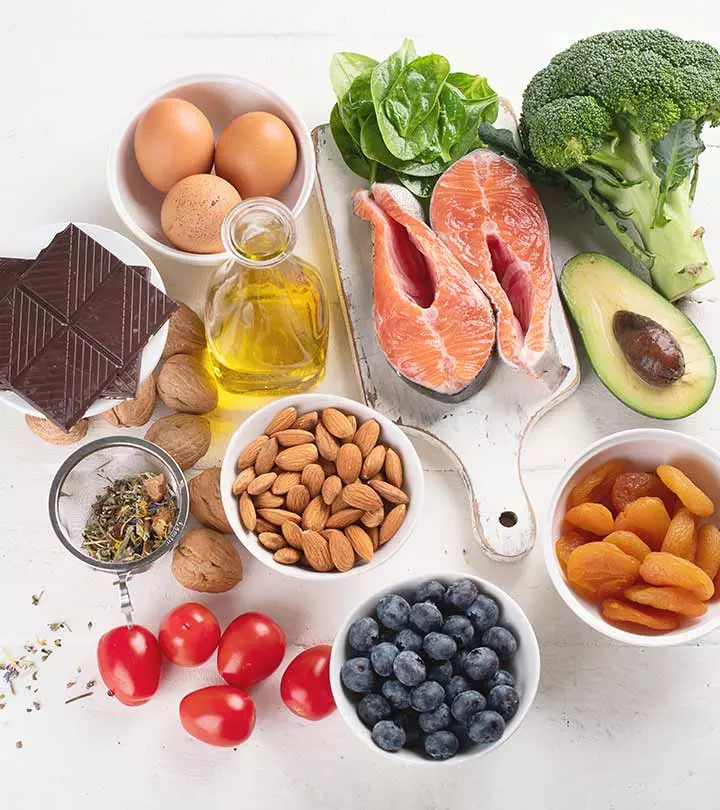




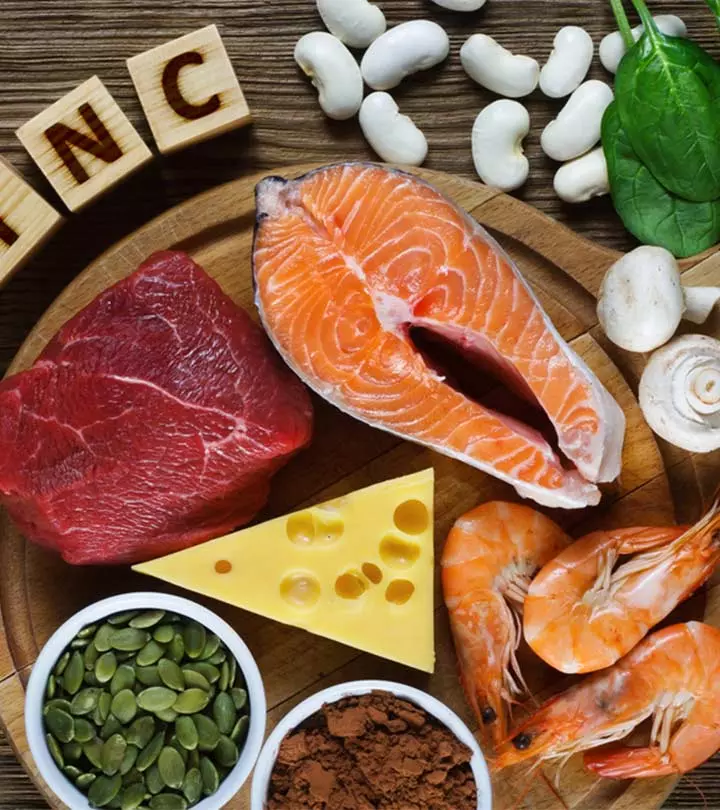


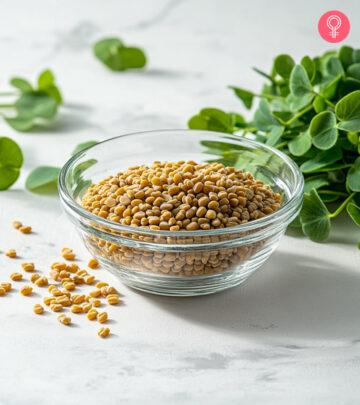


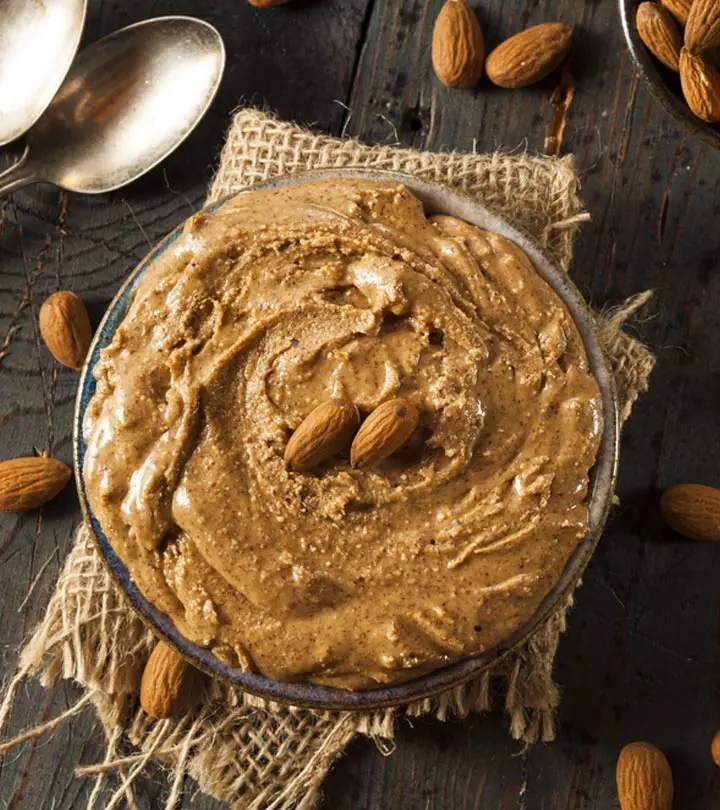



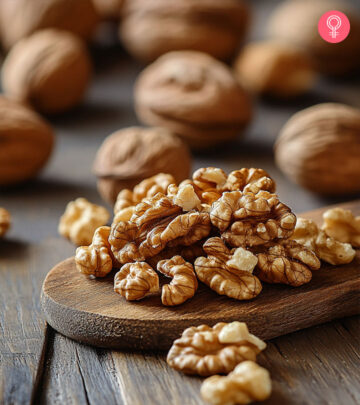



Community Experiences
Join the conversation and become a part of our empowering community! Share your stories, experiences, and insights to connect with other beauty, lifestyle, and health enthusiasts.